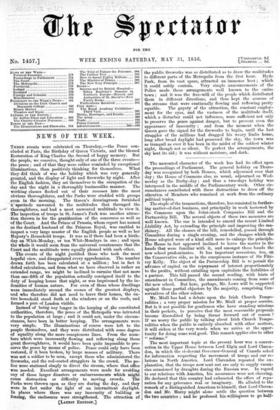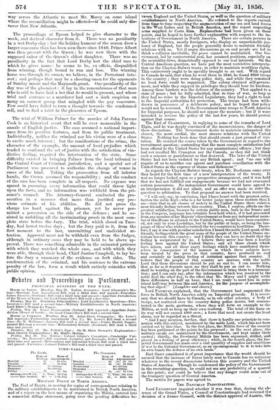The unwonted character of the week has had its effect
upon the proceedings of Parliament. The general holiday on Thurs- day was recognized by both Houses, which adjourned over that day; the House of Commons also, as usual, adjourned on Wed- nesday as the Derby-day ; and thus a two-days holiday was interposed in the middle of the Parliamentary week. Other cir- cumstances contributed with these distractions to draw off the _attention of Members who remained at work from the ordinary _political topics.
The staple of the transactions, therefore, has consisted in further- ing matter-of-fact business, and principally in work bestowed by the Commons upon the Joint-stock Companies Bill and the Partnership Bill. The several objects of these two measures are well known. The one is intended to amend the recent Limited Liability Act, by extending the principle and improving the ma- ehiner7. All the clauses of the bill, remodelled, passed through Committee during a single evening, and the changes which the House adopted were of a kind still more to enlarge the principle. the House in fact appeared inclined to leave the matter in the hands that were familiar with it, and amongst those hands the new school predominates. It has important accessions, too, on the Conservative side, as in the conspicuous instance of Sir Fitz- roy Kelly. The object of the Partnership Bill is to permit the advance of capital on the repayment of interest proportionately to the profits, without entailing upon capitalists the liabilities of a partner. This bill passed the second reading, with hints of amendment in Committee, the amendments coming from some of the new school. But here, perhaps, Mr. Lowe will be supported against those partial objectors by the majority, comprising Con- servatives of the other colour.
Mr. Miall has had a debate upon the Irish Church Tempo- ralities; a very proper mission for Mr. Miall at proper seasons. But is it not possible for gentlemen who have standing missions in their pockets, to perceive that the most reasonable proposals become discredited by being thrust forward out of season ? If we worry the public by talking about Irish Church Tempo- ralities when the public is entirely absorbed with other matters, it will sicken at the very words when we arrive at the oppor- tunity for doing some real good. This remark applies also to other " reforms."
The most important topic at the present hour was a conver- sation in the Upper House between Lord Elgin and Lord Claren- don, in which the ci-devant Governor-General of Canada asked for information respecting the movement of troops and our re- lations in North America. Lord Clarendon repeated the ex- planation, that the troops now sent out are only to supply vacan- cies occasioned by draughts during the Russian war. In regard to our relations with America, his assurances were not cheering. He declared that this country had exhausted the offers of repa-
ration for any grievance real .or imaginary. He alluded to the remark of a distinguished American to himself, that Lord Claren- don and Mr. Marcy might alone settle the question between the two couutries ; and he professed hie.-willingness to go he* Way across the Atlantic to meet Mr. Marcy on some island Where the reconciliation might be elected—if he could only die- cover that New Atlantis.



























